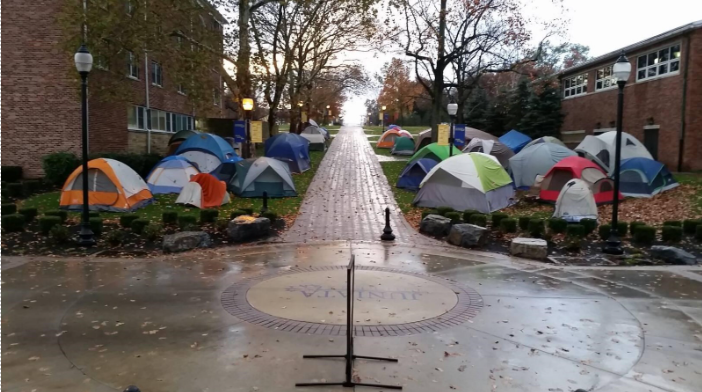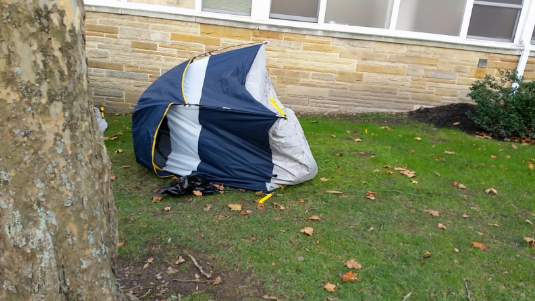On Tuesday, December 14, 1971, the newly constructed Ellis Hall held the first Madrigal dinner. Tickets were sold on a first-come, first-served basis, but the event did not garner the same popularity it does today.

Photo by Sutton Moore after some of the tents for tenting 2014 were pitched
It was not until the Juniata Activities Board asked the school chaplain, Andy Murray, to lead the sing-along that popularity soared and students started to form “Madrigal Line,” the ancestor of tenting. The first year that Murray sang at Madrigal, in the late 1970s, he introduced “The Twelve Days of Christmas” to the event. He signaled to tables that they should act out specific parts from the song and the “five golden rings” fell to the tables in the middle of the dining hall. Students jumped up onto the tables when it came time to sing “five golden rings.” According to Murray, the introduction of “The Twelve Days of Christmas,” more specifically, the five golden rings table, brought in a larger crowd for Madrigal.
Madrigal Line began as a one-day queue in Ellis Ballroom, where one table member signed-up for the rest of their group. However, students were not allowed to select their own table; they were placed at numbered tables according to their position in line. Table selection became such a fierce competition, and students started lining up at six o’clock in the morning, when sign-ups did not begin until eleven a.m. Eventually, students camped out in Ellis Hall overnight because everybody wanted to be in the five golden rings section.
A new format—true tenting—was pitched in 1993, as tents crowded the area between Kennedy Sports Center and Lesher Hall. Students remained in line all week. That year The Juniatian interviewed student Deb Turner, who said she “thinks this [camping] should be a tradition,” while senior Liz Roden said, “half the fun of Madrigal is the line.”
Two years after tenting had been established, former Dean of Students, Kris Clarkson arrived at Juniata in 1995 and said that the original tenters brought TVs, VCRs, and slept in U-hauls. However, rules needed to be established, not only to keep students safe but also to codify how long students had to be outside and how each tent was supposed to keep their place in line.
Today, tenting has evolved to include a series of roll calls and competitions that allow tents to move up or down the line, depending on participation. Tenting begins when the Juniata Activities Board sends out an email calling all tenters. Students then race to become “head tent,” the most coveted position. The winner of the race, head tent, leads the competition. They decide when to call roll, how often roll call should occur, and the activities that tenters compete in. Some past activities for tenting include original rap battles, dance-offs, talent shows, and scavenger hunts . Head tenters are the judges for these events and award points based on originality, humor, and talent. While tenters compete for the five golden rings table, tenting has does more to created a sense of community among Juniata students. Students show up to support tenters during their competitions, crowding around the steps of Ellis Hall to cheer on competitors.
Madrigal Tenting is more than just a way to seat people at Madrigal Dinner. In 1989, prior to Madrigal tenting celebrations, students collected more than five hundred cans of food for the Huntingdon County Food Bank, and The Juniatian reported that Madrigal Line represented a small glimpse into homelessness. More recently in an essay, Dr. Dennis Plane, of the Ppolitics Ddepartment on campus, compared tenting to the Occupy Wall Street movement that swept from New York City to college campuses across the country. Plane’s goal was to incite peaceful protest on campuses, rather than police intervention, and to show that, while Madrigal Tenting does not protest anything, peaceful and safe tenting is possible.

Photo by Sutton Moore after high winds knocked her tent to the ground
Safety of students was one of former Dean Clarkson's main concerns because tenting occurs in November, a time when Pennsylvania experiences a combination of rain, snow, and freezing temperatures. The solution to Dean Clarkson’s concern was to create a space for students to get warm, sleep, and eat, which he felt they had done successfully. The most common complaint of tenting is the noise from airhorns that signal roll calls, sometimes every hour through the night. Aside from this, Dean Clarkson thought there were far fewer problems than there had been because Juniata students are generally “good, well-behaved…humans.”
Tenting has become one of the most beloved Juniata traditions. With dozens of tents pitched every year, it can be concluded that Madrigal Tenting will continue for years to come. As former Dean Clarkson said, “Anything at Juniata that happens two or more times has somehow become this tradition that has to be there,” and so tenting remains.
Maddie Caso '17
Bibliography
Andy Murray, interview in-person by author and Bryce Dupes, February 9, 2015.
Burgan, Holly. “The Tradition of Madrigal: Options of the Line.” The Juniatian, December 9, 1993, page 2.
“Campus Crier,” The Juniatian, December 8, 1971, page 5.
Dean Kris Clarkson, interview in-person by author, February 9, 2015.
“Madrigal Dinner.” The Juniatian, December 13, 1979, page 2.
“Madrigal Line Nets 550 Canned Goods.” The Juniatian, December 7, 1989, page 1.
Plane, Dennis. “Tent Hysteria.” Inside Higher Ed. Accessed February 14, 2015. https://www.insidehighered.com/views/2011/11/28/essay-why-colleges-shouldnt-worry- about-tents.
